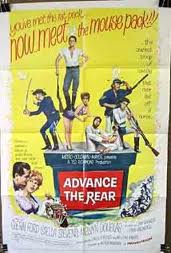
ADVANCE TO THE REAR
US, 1965, 86 minutes, Black and white.
Glenn Ford, Stella Stevens, Melvyn Douglas, Jim Backus, Joan Blondell.
Directed by George Marshall.
Advance To The Rear is more of a comedy than a western. It has a Civil War setting and treats the material of the Civil War and spying with tongue in cheek. Glenn Ford is an engaging hero and Stella Stevens a very attractive heroine. They were to work the following year in a more serious film, Rage. Glenn Ford had worked with director George Marshall in many films including Sheepman, It Started With A Kiss, Imitation General.
Undemanding but quite entertaining.
1. Audience response to a western, a comedy? To the blend of both? The understanding of the title, the alternate title as Company of Cowards? The song, the credits? The title as explained in the Civil War battle?
2. How well did the film use the conventions of the Civil War: battles, the two opposing sides, scouts, headquarters? How well did the film use the conventions of the western: the gold train, Indians, the town, the steamboat, the brothel, robbers, fight, romance? How cleverly were these parodied? The quality of the laughter evoked?
3. The use of Panavision, black and white photography., music and songs, the use of a wide variety of comic noises to highlight the comedy? How effectively?
4. How accurate was the parody of war? The hits at warfare? At traditions and the pretensions of war? How did it blend sentimentality towards the misfit heroes and their final success?
5. How was Brackenby the focus of the comedy? His West Point traditions, his manoeuvres for non-fighting in the war? His reluctance to join in the battle, the retreat and advance to the rear? How comic?
6. The presentation of the inquiry and the exasperation of the judges? The comedy in the succession of evidence?
7. The black comedy in the transfer of Company Q out west? The irony of their involvement in important action?
8. How was Heath the hero of the film? In the initial battle, as a genuine soldier, doctor? The importance of his clashes with Brackenby? His helping them during their exile? The foibles in his own character e.g. his falling flat on his face etc.? His involvement with Martha Lou and his romance? Discovering whether she was a spy? His love for her and its deadpan expression? His ingenuity in salvaging the reputation of Company Q? How suitable a deadpan mock hero for this kind of film?
9. The success of the continued satire through Brackenby? His manoeuvring of the Cavalry and ordering them, their falling from their horses etc.? His gallantry on the steamboat and memory of his wife, his visit to Martha Lou? Watching the women bathing? His acquaintance with Thin Elk? His leading the charge at the end? The irony of his reinstatement?
10. How attractive was Martha Lou as a spy? The preparation, her place on the steamboat, encounter with Heath, the sexual overtones of their encounter and each playing a game of discovery? Her intrepid continuing of her mission despite all odds? Despite the romance with Heath?
11. The comedy in the individual soldiers? With hiccoughs, the horse's following the soldier. the explanations of the misfits and their misdemeanours? A comic company for the final fight?
12. The contribution of Jenny and her girls? A tone of spice for the film, their involvement in the final battle?
13. The satire with the Indians and Thin Elk as an alumnus of West Point? His manoeuvre to distract the Cavalry?
14. How humorous was the final battle with the men in their underwear? Using skis down the western mountainside, using catapults and ditches in the town?
15. Martha Lou and her continued devices to remain a spy? Heath's deadpan imprisonment of her?
16. Such films show the American heritage, its good and its bad. How were these highlighted by the parody and the ability to laugh at them?